Far Away Eyes’ Review: Supernatural 8.23 – “Sacrifice”
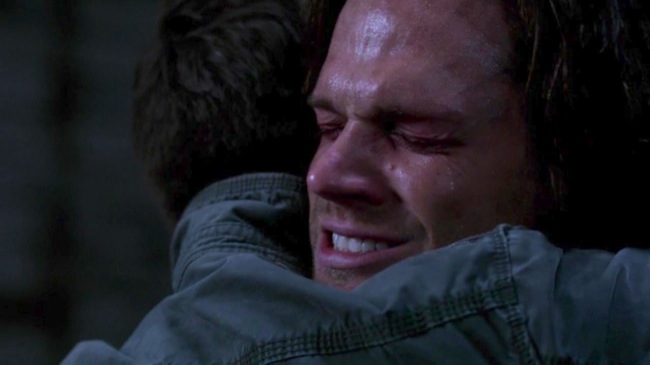
Let’s start with Castiel. The angel has much to atone for—more than the destruction he wrought in his brief stint as “God.” He has worked with Crowley behind Sam and Dean’s backs, retrieved Sam from the Cage—all while leaving the younger Winchester’s soul behind, and taken the Angel Tablet away from Dean without explanation. Here, however, he sees his chance to find that long sought forgiveness and redemption, and he will do what ever it takes to make it work.
He is following Metatron’s lead in undertaking what he believes are the Angel Trials to close down Heaven, much as Sam is attempting the Demon Trials to close Hell. Castiel believes that it is the right thing to do—an important step in fixing what he has broken after he took in the souls of Purgatory and unleashed the Leviathans on the earth. He tells Dean in a firm but desperate voice, “But I’m the only one who can. I can’t fail, Dean, not on this one.”
Unfortunately for Castiel, this is a fatal mistake that will wreak more havoc than ever before. It’s a shame for the angel because once again his good intentions have bitten him hard.
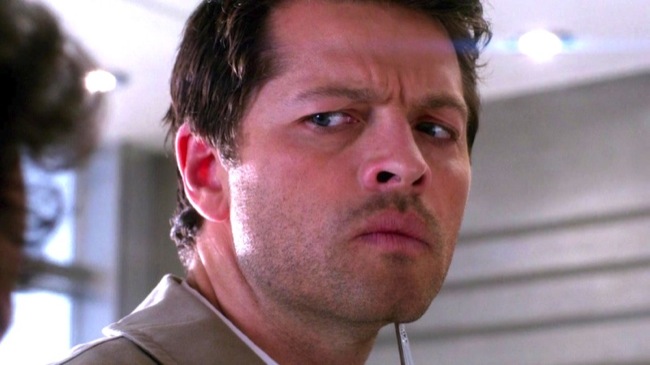
Of the two creatures in Supernatural—demons and angels—angels are by far the more deceitful and underhanded in their dealings. Demons may use subterfuge at times to get their hooks into someone, but they are often “what you see is what you get.” They are evil creatures bent on wreaking pain and suffering upon others—and they don’t hide that fact. Angels, on the other hand, will lie and deceive someone by trying to tell their victim they are doing the right thing, that saying “Yes” as Sam and Dean are told repeatedly in season 5 will be a good thing, that they are doing God’s work.
Part of Castiel’s problem is that he is an angel. Angels may lie and deceive often to get what they want, but they are also soldiers, born to follow orders without question. It is one of Castiel’s greatest failings. He is continually looking for orders, direction for someone—anyone. Here, he will turn to yet another angel to find out what he should do—none other than Metatron.
Metatron pinpoints Castiel’s weakness immediately. He knows that the angel is trying to atone for his wrongs against Heaven—and thus he can exploit this weakness easily. He targeted it carefully with precision in “Clip Show,” telling Castiel, ” Look, I know. But now the angels — Heaven — need someone to come to the rescue. They need us.”
Castiel, so utterly desperate to fix what he has done wrong, falls for this hook, line, and sinker. It will be his undoing in “Sacrifice.”
While Castiel is trying to help the Scribe of God execute the “Angel Trials,” they are caught by Naomi. She has been seeking him for eons and now has caught him. If she cannot have the Angel Tablet itself, she will do one better and go straight to the source. It is her folly, however, because as the Scribe, Metatron knows all the weaknesses, all the strengths, and has many secrets Naomi can’t possibly imagine. She doesn’t have enough time to extract them from him, either.
As they argue about taking the Scribe into custody, Metatron keeps his facade in place for Castiel. He tells him, “Stop. Please, Castiel, don’t make this any worse. Please.”
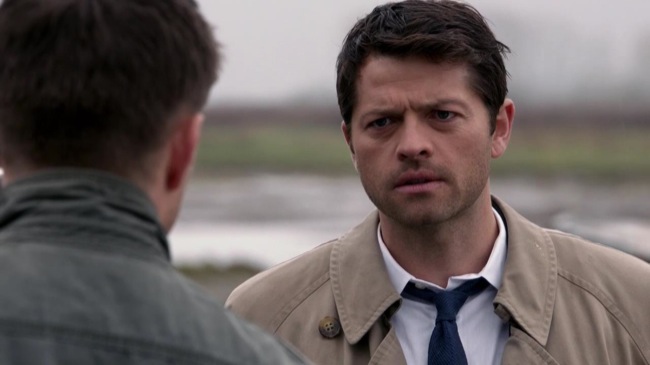
With a flutter of wings, the Scribe and angels are gone, leaving a bewildered and even more desperate Castiel behind. He has to continue the “Trials” alone now—to stop Naomi from extracting Metaron’s secrets about the Tablets from him—and redeem himself by closing Heaven. He believes completely that this is the answer he’s sought since he wreaked havoc upon his fellow brethren—and he will foolishly see it to the end. He wants to earn the forgiveness that has eluded him for so long—not just with the other angels, but with the Winchesters. If that means locking all angels away to do it, he will.
But he can’t really do it alone. He turns to Dean in his time of need, telling the hunter that Naomi has Metatron in her grasp. He tells him, “We’re gonna shut it all down — Heaven, Hell, all of it.”
Dean, however, wants confirmation about these “Trials,” and so he takes the acquired Angel Tablet in their doublecross of Crowley to Kevin to translate. Only true way to know for certain what the Trials entail is to read it for themselves. Unfortunately, it took “six months and a dead mom” for Kevin to translate a small piece of the Demon Tablet. There’s little time to confirm what Castiel is certain will be a major step in his redemption—and being worthy of forgiveness. They will simply have to continue with what Metatron has told them is the next trial: capturing a cupid’s bow.
Dean, however, wants confirmation about these “Trials.” After tricking Crowley, he now has the Angel Tablet, and he takes this to the prophet to translate. Only true way to know for certain what the Trials entail is to read it for themselves. Unfortunately, it took “six months and a dead mom” for Kevin to translate a small piece of the Demon Tablet. There’s little time to confirm what Castiel is certain will be a major step in his redemption—and being worthy of forgiveness. They will simply have to continue with what Metatron has told them is the next trial: capturing a cupid’s bow.

Dean, a reluctant passenger, tags along with Castiel. They visit the same bar that Metatron pointed out earlier and wait for the moment a cupid will strike their intended target with an arrow of love. Finally she arrives and after she fixes her couple up, Castiel and Dean follow her into the street. Castiel, tactful as ever, demands, “Give us your bow.”
At first Gail, the cupid, questions this. After all, it is an unusual request. Much like the other angels, however, she has suffered under the collapse of Heaven’s hierarchy. She tells Castiel sincerely, ” I’ve been afraid to go home for some time now. Orders used to come once a day, and now it’s chaos. It all seems to be breaking down. And you think you can fix that?”
It is just what Castiel wanted to hear—even though he is falling ever deeper into Metatron’s trap. He desperately wants to fix his wrongs—and here he has Dean as witness that he is indeed making that effort.
As Dean talks on the phone with Kevin, the prophet tells them the ugly truth. He says, “I think I found the Angel trials, but I don’t see anything about a Nephilim or a Cupid’s bow or anything like that.” It’s the first real indication for Castiel and Dean that they’ve been led on a wild goose chase.
Naomi arrives and confirms this. She tells Castiel and Dean, “He told you he was going to fix Heaven, didn’t he? Murdering a Nephilim, cutting off a Cupid’s bow — it’s a lie, all of it. I’ve been in his head.”
Metatron had seen an easy target in Castiel. The angel, so desperate for forgiveness, didn’t think to question the unassuming Scribe. And yet, he doesn’t have an idea of how bad it will get. Not yet. It was easy for Castiel to trust him, however. After all, this was the angel in charge of taking down God’s word. He would be the one to know what exactly was on those Tablets—and he had sold Castiel on the notion so completely that they were the same. They were outcasts in Heaven’s hierarchy, they were the only ones that could fix what was horribly broken in the archangels absence, and it would turn Castiel into the hero once again. The mere idea that it could come true kept Castiel spellbound—long enough for Metatron to set everything into motion—with almost no way to stop it.
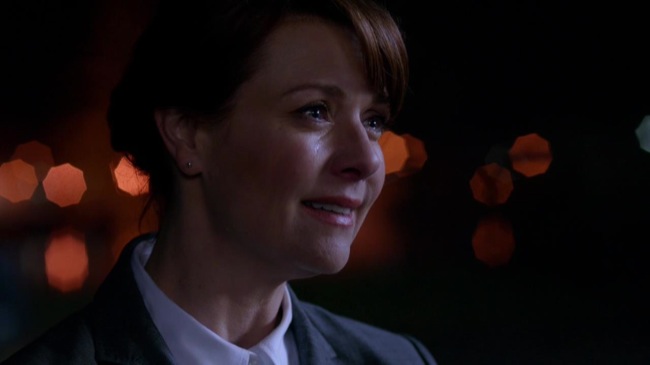
Naomi tells them what Metatron’s ultimate end game is, “Expel all Angels from Heaven, just as God cast out Lucifer.”
There is only one way for Castiel to confirm her allegations. He must confront Metatron himself. Unfortunately, it is the last thing he should do. It plays right into the Scribe’s hands. For Castiel is the last piece in a spell. He will be sacrificed in order for Metatron to truly cast all the angels out of Heaven. Before he can do anything, the Scribe that had claimed to be nothing more than a “pencil-pusher” has Castiel strapped into Naomi’s chair. He needs a particular piece from the angel—his grace.
It is a painful procedure—and yet in an unusual way Metatron may be giving Castiel a gift. He tells him, “And now something wonderful is going to happen, for me and for you. I want you to live this new life to the fullest. Find a wife. Make babies. And when you die and your soul comes to Heaven, find me. Tell me your story.”
By removing his grace, Metatron has made the angel into a human—not unlike Anna had once been. He is no longer a celestial being, but a mere mortal. As such, Castiel has perhaps the first real chance he has ever had to potentially redeem himself. He can now truly understand what it means to have free will—and not as an angel trying to fit the round concept into a square hole—but to truly know what it means.
They say that “to err is human, but to forgive is divine.” In Castiel’s case, it is perhaps being a human being that will allow him to finally understand just what forgiveness is and to learn what it means to earn it—and to give it. It is a chance that he would have no other way—and if Castiel can take this opportunity for what it is, he can perhaps truly start the path to fixing what he has done wrong in the past. Perhaps once he does regain his grace he can take those lessons and truly apply them as an angel, too.
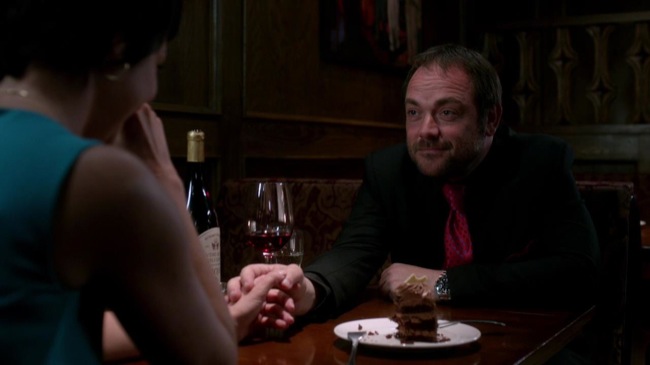
On the other side of the equation, we see a desperate Crowley finally meet his check mate at the hands of the Winchesters. He believes he has the upper hand. After all, he has trapped another of their allies—Jody Mills—with another hex spell. They have little time to negotiate with the King of Hell if they wish to save her life. Dean barks at him, “We stop the trials, and you stop the killing.”
Crowley agrees to meet, and they come face to face. The King of Hell is as smug as ever, proud that he has brought the Winchesters to their knees—all simply by killing a few of those they had saved. He quips with glee, “What’s that old expression? Success has many fathers. Failure is a Winchester.”
But the joke is really on him.
After he rolls out the extremely long contract, making Dean remark, “Yeah, I’m sure there’s no hidden agendas in there,” there is little left to do but allow the Winchesters to sign. He will get what he wants—the Demon Trials stopped—and the Winchesters will no longer have to worry about those they’ve saved being killed. As a bonus, he’ll also have the Demon Tablet—finally whole again. There’s no doubt that Kevin was probably also part of the package—if Sam had actually signed the dotted line.
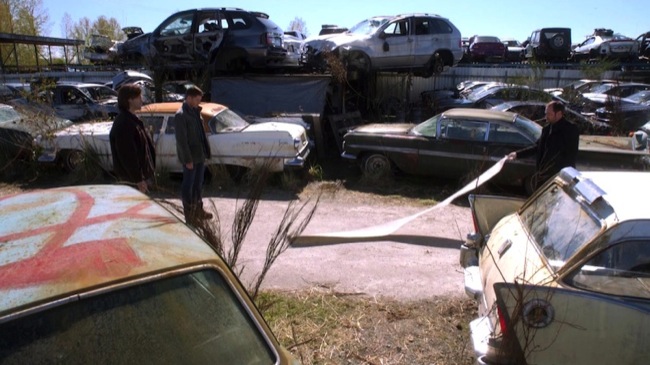
It isn’t until Dean works his way up the contract—making a show of reading the fine print—that Crowley realizes he’s been had. By then, demonic handcuffs are latched onto his wrist, and the truth has come out. Sam tells him coldly, “You’re the third trial, Crowley.”
The third trial. To cure a demon.
They head to an abandoned church where they’ve already consecrated the ground and chain the King of Hell there. It will take at least 8 hours of grueling effort on Sam’s part—but if he should succeed not only will Crowley no longer be a threat at all—all of Hell will be closed for good. It is the ultimate win in the Winchester’s book—and they will sacrifice almost anything to get it. Almost.
The footage with Father Thompson shows the changes in the demon possessing Peter Kent. They are gradual and painful. He starts off facing a demonic monster, snarling about how “Orgasmic” it was to kill Kent’s family. It becomes less enthusiastic about its predicament, instead hurling vicious insults at the priest. And finally, by the end, the demon is sobbing and mortal again. It tells the priest that he is sorry for what he has done. It is a powerful wave of guilt and remorse that has washed over the once evil creature—and this is Crowley’s future.
Sam approaches with the first injection, and Crowley scoffs, “You really think injecting me with human blood is gonna make me human? Did you read that on the back of a cereal box?”
He is defiant. He’s furious that the Winchesters managed to best him here, chaining him to this chair. The first dose seems to have little effect, but it has already set of a minute chain reaction within the King of Hell. That doesn’t mean he won’t try to reach out for help. He bites Sam viciously, drawing enough blood to use to call out to any other demons in the area. He whispers desperately, “For the love of everything, whoever is hearing this — if anyone is hearing this — this is your king. Send help immediately.”
He may not be able to feel any “change,” but the thought of it frightens him. That doesn’t mean that Crowley won’t hide his fear. He breaks into a cover of David Bowie’s “Changes,” taunting Sam as he continues the Trial. It may be a sarcastic rendition, but it doesn’t seem to have nearly the punch of Crowley’s past insults. It’s a bit subdued, a bit vulnerable. It’s proof that this is indeed working—albeit slowly.
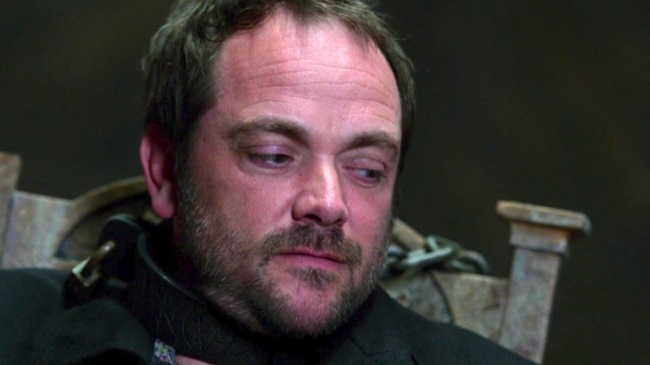
Unfortunately for both Sam and Crowley, the one answering his call for help is none other than Abaddon—and she is unimpressed with the current King of Hell. She has no sympathy for his situation—and easily overpowers Sam, leaving the vulnerable Crowley at her mercy. She purrs at him, “Right now you and I are gonna talk about regime change.”
But right now, the Knight of Hell is in the way. Sam recovers and promptly sets Abaddon on fire, forcing her to flee her current meat suit. It is certainly not the last time we shall see her by any means,a and it’ll be interesting to see how she changes things in season 9.
It allows Sam to get back to the Third Trial, and he sets Crowley back upright, preparing to dose him with the next injection of purified blood. Here we start to see the first real significant change in Crowley—he is slowly, little by little, being cured. About stopping Abaddon, he tells Sam with all sincerity, “You did good back there, Moose. I’ll deny it if you ever quote me, but I’m a proud man. I’m proud of you.”
That doesn’t mean he won’t plead his case to Sam to stop. He sees the next syringe ready, and his vulnerable expression begs for him before he even opens his mouth. This isn’t the typical King of Hell we’ve come to know. There is much more humanity now, less snark, less cruelty, more fear and human understanding. He pleads, “We just shared a foxhole, you and I. We beat back the Tet Offensive, outrun the –the Rape of Nanking together! And still you’re gonna do me like this?!”
Sam prepares another injection and approaches. In the most shocking moment, Crowley asks in a pleading whisper, “I’d like to ask you a favor, Sam. Earlier when you were confessing back there, what did you say? I only ask because given my history it raises the question where do I start? To even look for forgiveness, I mean.”
Sam answers, “How about we start with this?”
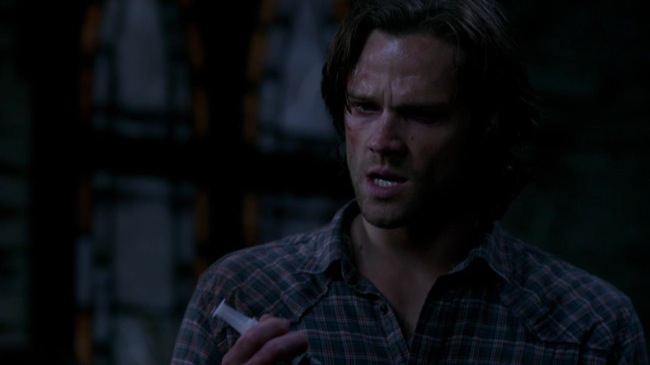
As we see him inject Crowley, there is a resigned but peaceful expression on his face. The King of Hell is changing through this process—and by even raising the question of forgiveness, we see a demon seek out what has been denied them most in Hell. Hell is a place of pain, of suffering, of eternal agony. It is a place where darkness prevails. The only answer to actions in life and in death are answered with more torture, more pain, more agony. There is no end, and it will only become worse as time goes on. What makes Hell most painful, however, is not that it is an endless torture of the soul. It is because it deprives one of an essential necessity that truly makes it Hell.
There can be no forgiveness in Hell. Ever. It is not designed to work that way. As such, all those who reside within its ugly walls are left to pine for the one thing they can never ever have. Here, Crowley is discovering just how much he missed it. As the soul is twisted in Hell, demons forget what it is like to forgive or to be forgiven. They are violent and vicious—and to cope with what they can’t have they lash out at the world around them brutally. For the first time in centuries, Crowley is experiencing the human desire for forgiveness.
But this will come with a high price: guilt. He doesn’t know where to start. What sin does he purge first? What wrong does he atone for first? It is his guilt that may be a far worse torture than anything Hell could have ever devised. It could have the potential to cripple him, to weigh him down so heavily that he cannot rise again. And yet, broken as he is from this new found guilt, it could be the fuel he needs to start acquiring the forgiveness denied him for so long.
Before Sam is stopped just short of completely curing Crowley, we are shown a pacified King of Hell. He is still chained to the chair, left to mull over all that he has done—all of it. We are left with him in this state, hovering between being cured and still remaining a demon in some form. It will only be a matter of time in season 9 if we see Crowley continue on this path set out by nearly being cured or if he will slowly revert back to the dark force he has become in Hell’s furnace of pain. He has his starting point on the road of forgiveness—he yielded to Sam’s injection—now it will be up to him to take the next step—but only if he wishes to find true redemption.
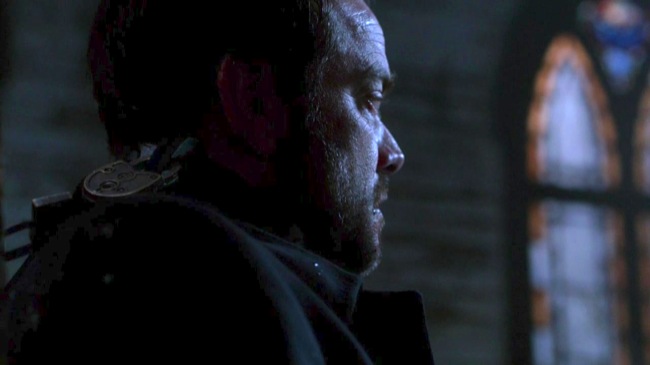
As this Trial changed Crowley, it also points to Sam’s desperation to atone for what he has done. He has undertaken these Trials for many reasons. He told Dean in “The Great Escapist,” “Because these trials… they’re purifying me.”
Based on that statement, the obvious answer is from his original taint of demon blood from Azazel and everything that followed because of it. He has done many things that he seeks redemption for. Dean tells him, “All right. Well, I’m just spit-balling here, but if I were you, uh… Ruby, killing Lilith, letting Lucifer out, losing your soul, not looking for me when I went to Purgatory.” But none of these things are the real reason for why he has done these Trials. Not one of them. They are symptoms of the real reason.
Sam, in many ways, already redeemed himself for most of what he did wrong in season 4. He made the ultimate sacrifice by jumping into Hell with Lucifer trapped inside—putting the Morningstar back from whence he came. He made a mistake in killing Lilith and trusting Ruby, and he fixed his mistake by doing the unthinkable. This isn’t what he must confess here to purify his blood. That taint has already been wiped clean a hundred fold by his time in the Cage—and his hallucinations of Lucifer afterward.
He does not have to confess about his soulless period, either. That is not the issue here. That is not the greatest sin he carries. Besides, if anyone is to blame for that, it is Castiel. His soulless self may have committed countless atrocities, but none of them would have happened without the angel’s mistakes.
No, Sam’s greatest sin, as he confesses openly to Dean just short of curing Crowley is, “You want to know what I confessed in there? What my greatest sin was? It was how many times I let you down. I can’t do that again.”
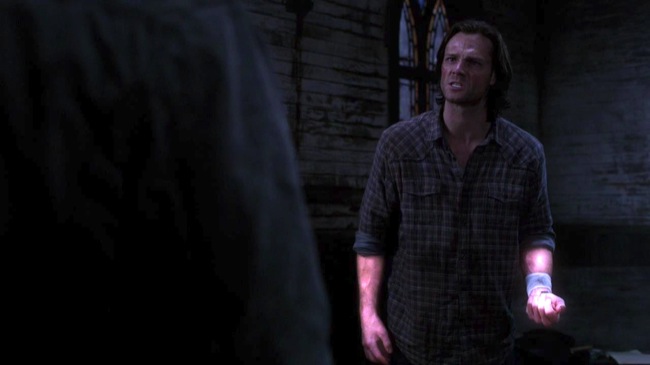
This isn’t about keeping his demon blood taint secret from Dean. This isn’t about trusting Ruby. It’s not even in the equation. It’s not about starting the Apocalypse by killing Lilith. It’s not about drinking demon blood. It’s not about not looking for Dean after Dick Roman’s demise. None of these things are the issue.
What Sam is referring to here is more heartbreaking—something we saw echoes of in earlier season 8 episodes like “Heartache.” Sam can’t watch his brother die anymore—and in “Mystery Spot” he was forced to witness repeatedly the failure he was doomed to commit: not saving Dean from Hell in the first place.
This and this alone is Sam’s greatest sin—the one thing he wants the most forgiveness for. He has accepted everything that has happened to him from being trapped in the Cage to hallucinating Lucifer to being soulless because he felt that it was more than a fitting punishment for failing to save his brother from Hell—after all the times Dean had saved him. It has weighed heavily on Sam for years—and while not blatant in its exposure here, it is evident in the timbre of Sam’s broken voice.
He failed to save his brother from going to Hell—and it was his fault.
And yet, the curious thing about Dean’s suggestion list, “Ruby, killing Lilith, letting Lucifer out, losing your soul, not looking for me when I went to Purgatory,” not saving Dean from Hell is not amongst the litany of Sam’s sins. If we think about how Dean ended up in Hell, it was the elder Winchester’s choice after all. Dean does not blame Sam for his going to Hell. Not once. It’s why it’s not listed in Dean’s suggestions for Sam. How can Dean hold Sam accountable for something he willingly did?
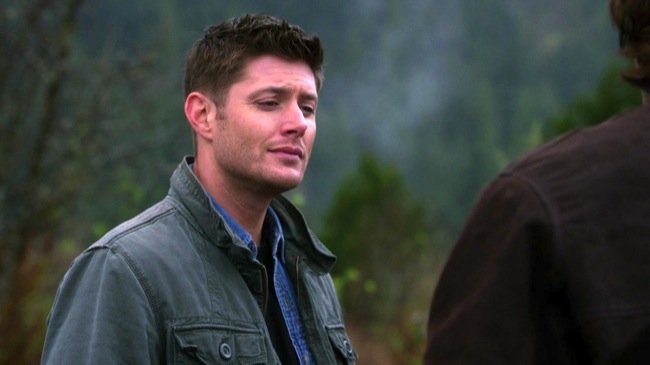
Dean made the conscious choice to make a deal—one year for Sam’s life. He understood those terms, and while at the very end he wanted to get out of it, he made the deal knowing that it would end with him in Hell. He was content with that—mostly. After all, given the choice between a dead brother and going to Hell, Dean would choose to go to Hell every time.
We spend all of season 3 watching Sam desperately trying to find a loophole, a way out, anything that will save Dean from the hellfire sure to come. He looks for ways to kill the Crossroads Demon, hoping to break the contract. He looks for spells. In the eleventh hour before Dean’s deal comes due, Sam attempts to confront Lilith. All fail, and Dean is torn to shreds by hellhounds and dragged to Hell.
Sam’s self-flagellation continues once Dean is returned from Hell. He is hellbent on killing Lilith. He may have failed in stopping Dean’s deal from coming due, but he was going to make certain the demon that held Dean’s contract paid. He has been trying to make up to Dean all this time—in both the right way and wrong way—for what he sees as his ultimate failure. Even Sam’s redemption storyline in season 5 reflects this.
When it comes time to undertake the Trials in “Trial and Error,” it is Dean that insists on being the one to do them. He will be the one to kill a hellhound. He will be the one to close Hell. Yet, it is Sam that will do them. Here, finally, is his chance to redeem himself for his failure for once and for all. If Hell is taken out of the equation, it no longer can pose a threat to his brother—and it will finally equal out Dean’s deal coming due. He will have triumphed. Sam will have repaid his debt to Dean—for his restored life after Jake killed him at Cold Oak. He will finally have the forgiveness he has wanted all along—the forgiveness he thinks he’ll never have.
But he’s wrong. Sam had been forgiven long ago. Dean, despite his anger in the past, is capable of great forgiveness. We’ve seen it in action in episodes such as “And Then There Were None.” He is willing to wipe everyone’s slate clean, that when the time comes, they’re all good. In many ways, this is the lesson Dean has been teaching Sam the most. Here, Dean tells him, “Hold on, hold on! You seriously think that? Because none of it — none of it — is true. Listen, man, I know we’ve had our disagreements, okay? Hell, I know I’ve said some junk that set you back on your heels. But, Sammy…come on. I killed Benny to save you. I’m willing to let this bastard and all the sons of bitches that killed mom walk because of you. Don’t you dare think that there is anything, past or present, that I would put in front of you! It has never been like that, ever! I need you to see that. I’m begging you.”
But there is still a problem. Sam has gotten this far—one breath away from completing the Trials that will cost him his life. How can he stop? Is it already too late? Dean tells him, “Metatron lied. If you finish this trial, you’re dead Sam,” and Sam bluntly replies, “So?”
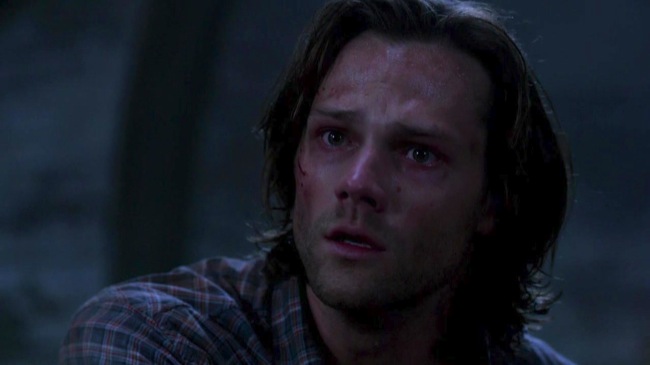
Can Sam truly be willing to die? When they first started these Trials, Sam told Dean, “Closing the gates. It’s a suicide mission for you. I want to slam hell shut too, okay? But I want to survive it. I want to live. And so should you. You have friends up here, family. Hell you’ve even got your own room now. You were right, ‘kay. I see light at the end of this tunnel and I’m sorry you don’t. I am. But it’s there. And if you come with me, I can take you to it.”
Along the way, Sam lost sight of why he was doing these Trials. He was so focused on being forgiven for his sin—and yet the best way for him to repay his brother is to live and to bring his brother with him. That is really what Dean wanted when he made that deal long ago—and it is still all he wants now.
Sam may have stopped short of reaching their goal, but Dean tells him, “Just let it go.”
This statement has double meaning. He is telling Sam to let the Trials go—but he is certainly telling Sam to let his guilt go, that his sin is washed away—and most of all to forgive himself. It is the lesson that Sam must learn. It is a lesson we all must learn.
Just as much as Sam wanted to be forgiven, Dean wanted to forgive. For them to move past this most painful of moments, they must forgive each other and themselves. It is the true “sacrifice” in the episode. They must burn the anger, the resentment, the hurt on its very own funeral pyre and sacrifice it in order to let it go. If they do not, it will repeatedly fester between them. Here is their first crucial step in doing just that.
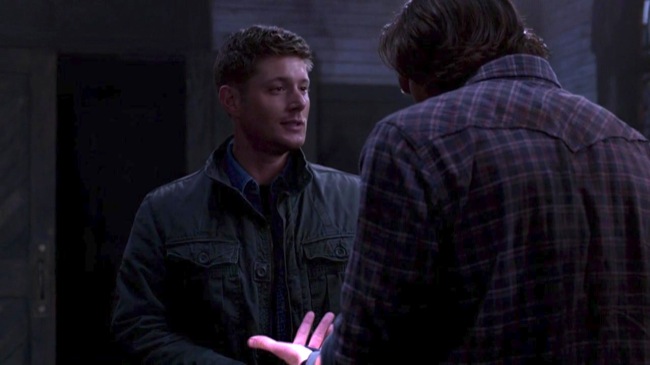
Forgiveness. It is what drives some to do desperate things—only making things worse as Castiel has done again. What comes from that remains yet to be seen—as angels streak to the earth in agony. It is the one thing held from demons like Crowley, turning them into angry and cruel creatures that don’t even know where to start looking for it. Our search for forgiveness can make us punish ourselves for sins long forgiven already. And it is forgiveness that we must all learn. It is a lesson Supernatural explores well, tying all their various storylines with its powerful thread.
However, as we see Sam suffer from the effects of the Trials—and possibly by stopping them—we know that this is going to be an uphill climb. The only hope we are left with here is the fact that the Winchesters are together as brothers once more, united. That is perhaps the most beautiful sight of all.
Kim Rhodes was a big surprise as Jody Mills. She delivered in her brief scene opposite Mark Sheppard’s Crowley brilliantly. We could sense the weight of her family loss hanging around her, all while having hope in a new start. All the charm we’ve come to appreciate about her was put into the line, “I’m pretty much what I am — small-town girl.” Rhodes put a bit of humor into the situation when Jody gives herself a pep talk in front of the mirror. She’s nervous and excited, and while we know who she’s sitting across, we can’t help but be taken in by her anxious enthusiasm—all before Crowley’s spell takes effect. We’re left to wonder about her fate—and it makes us nervous for the beloved Sheriff of Sioux Falls.
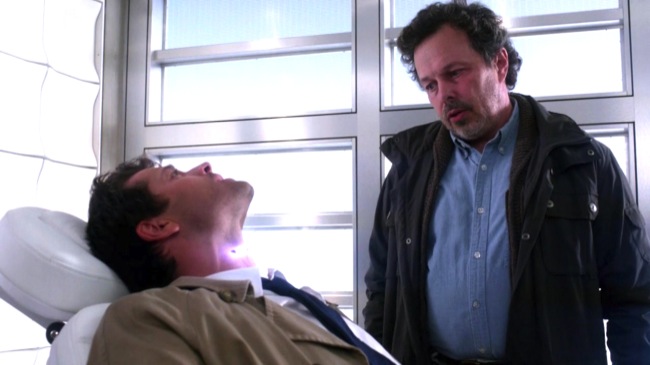
Curtis Armstrong makes Metatron unassuming until the last moment, until the big reveal. He made the angel very ambiguous—we couldn’t figure out if he was truly friend or foe until it was almost too late. He seems like the “pencil pusher” he’s sold himself to be, nonthreatening, and yet we can truly sense that we can’t trust him. We’re uncertain of his agenda. Once Metatron is revealed for what he is—an angry and spiteful angel—Armstrong puts on a smug veneer. Like other angels we’ve encountered in the past—Zachariah, Uriel, Lucifer—there is a sense of entitlement hanging around him, a thick pettiness, and we can see it all in how Armstrong carries himself to convey this aspect of his character. He is cruel and capricious in his treatment of both Naomi and Castiel. Even when Metatron had been trapped in Naomi’s chair, Armstrong makes certain that we can sense it is Metatron that has the upper-hand—and we are proven right when Castiel comes upon the dead angel with Metatron waiting to strike. As Metatron cuts Castiel’s grace from him, Armstrong puts a pleased expression on his face, almost gleeful. Metatron is getting what he wants—and he is punishing all of Heaven to do it. There’s a twisted edge in Armstrong’s voice as he delivers the line, “Find a wife. Make babies. And when you die and your soul comes to Heaven, find me. Tell me your story. ” Now that he has cast all of the other angels out, the question becomes what will he do next? Since he already knows what is on every tablet, Metatron is dangerous. There is no real way to gain the element of surprise. It will be interesting to see just where they take him next year—and how Armstrong continues to evolve the character on screen.
Amanda Tapping reprises the mysterious Naomi one last time. In the beginning of the episode she is pleasantly surprised to hear that they have found Metatron. Tapping puts on a pleased smile, conveying that Naomi knows that she has one better than any of the Tablets. She shows just how little Naomi understands when confronted with Metatron—all shown with facial expressions and terse dialogue. Tapping also shows Naomi’s vulnerability well when she finally tells Dean and Castiel the truth. Her most powerful line in her entire portrayal of the character is one of her last, “Our mission was to protect what God created. I don’t know when we forgot that. I want nothing more than to see you shut the Gates of Hell, but I told you that you could trust me. If Sam completes those trials, he is going to die.” Tapping makes this line ring true. There is no hidden agenda laced in this statement. It is sincere and in its delivery we feel that perhaps Naomi can eventually become an ally—if not for becoming Metatron’s victim.
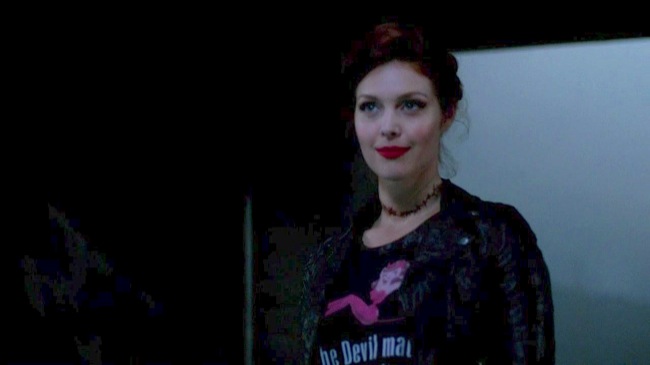
Alaina Huffman delights on screen as Abaddon. There is a no fear aura around her as she strides into the church. Abaddon puts on all the snark, carried through well in Huffman’s delivery. She looks larger than life on screen, unstoppable, and dangerous with just a look. We can tell that Abaddon relishes in her control over Crowley—tied and trussed for her already—as Huffman smiles viciously. As she is hit with the holy oil, we see Huffman change Abaddon’s demeanor from one of triumph to one of disbelief. The Knight of Hell can’t believe that she has been bested, and and she burns we are left to wonder who will play this formidable demon next.
Osric Chau continues to grow as the prophet Kevin. He has become much more sarcastic than he ever was in his debut. Chau makes us laugh when he delivers the line about whyKevin hid the Demon Tablet under a devil billboard, “What? I was delirious.” He then tugs on our heart strings when he says quietly and with resignation, “I don’t have any friends.” He shows us Kevin’s absolute frustration at yet again being dragged into things when he declares, “It’s what I did. You told me I was out, Dean.” And as the angels fall, Chau shows us Kevin’s disbelief and awe as the Men of Letters Bunker lights up in reflection of the awful activity happening outside its protective walls. It will be curious to see how Kevin develops in Season 9—and how Chau grows as an actor himself.
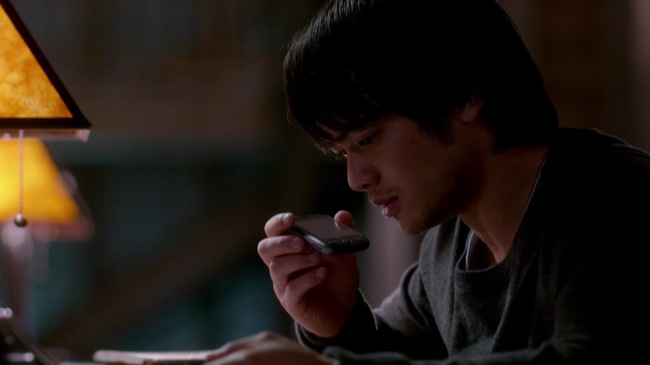
Mark Sheppard delivered a stellar performance here. Crowley starts dastardly as ever, pretending to go on a date with none other than Jody Mills—all in an effort to thwart the Winchesters. He is as snarky and suave as ever when confronted at Bobby’s yard, contract in hand. His signature biting wit is on full display when he quips, “Really, Dean? I’m trying to conduct a professional negotiation here, and you want to talk dangly bits?” Sheppard shows us Crowley’s surprise well at being check mated by the Winchesters, all in just a simple and subtle shocked facial expression. Once chained down, Sheppard keeps Crowley’s snark going—but we can sense in his tone a sense of desperation and fear. Even as he sings David Bowie’s “Changes” we can sense he knows he lost. It’s over, and he can’t do anything to really stop it. Not now. After Crowley bites Sam in his effort to call for help, Sheppard puts the smug expression back on—momentarily. He says, relief and triumph in his voice, “Why send in a few grunts when you can send in a knight? ” It is short lived and we see Sheppard shift again—this time into fear as Abaddon threatens him and hurls Sam aside. He is helpless here, at her mercy, and he realizes she is not here to rescue. She’s here to take his throne. It is after Sam gets rid of Abaddon that Sheppard really turns up this performance. The cure seems to be changing Crowley bit by bit. He isn’t as snarky, he sounds less smug. As he shouts, “We just shared a foxhole you and I. We beat the Tet Offensive, outrun the Rape of Nanking – together! Instead you are going to do me like this? Band of Brothers! The Pacific! None of this means anything to you? All those motels – you never once watched HBO? Not once? Girls! You’re my Marnie, Moose. And Hannah She deserves to be loved. Don’t we all?” Fear is laced here in Sheppard’s voice, conveying Crowley’s distress well. When Crowley says Sam’s name—not one of his many nicknames—all of the human emotion starting to emerge in Crowley laces through that word. And as Crowley asks Sam about his own confession, there is anguish in Sheppard’s voice—as the King of Hell realizes just how awful he’s been past and present. It’s a heartbreaking moment, and an interesting twist, sold well by Sheppard. We’re left to wonder how sincere Crowley is. As Crowley bares his neck for yet another dose, however, Sheppard makes us want to believe he’s nearly cured. It is accentuated with his facial expression, resigned and guilty. We’re left to wonder what type of Crowley we’ll see in season 9—a reformed demon almost human again or Crowley as we’ve come to know him?
Misha Collins plays the ever socially awkward Castiel—laced with a character struggling to fix what he has done wrong. We can sense a desperation in Collins as he delivers his lines—and each scene has that element. Castiel has a frantic edge around him, and he wants to complete these “trials” as quickly as possible. Collins reminds us how much Castiel lacks in social grace first with the bartender and asking if he’s into “domination” and later when he grabs Kevin and tells him that he will always be a prophet. There is no subtlety in Castiel—especially when he is under the gun here. We see him reach heights of fear when confronted with Naomi—and while Collins shouts the line, “She lies,” we can hear in his voice that Castiel has begun to doubt what he is doing. His latest attempt to right his wrongs has failed, again. As we see his grace ripped from him, Castiel looks vulnerable, weak, and frightened—and it is largely through the use of facial expressions only. Collins really shows us how far Castiel has fallen in that last moment we see him, back on earth, broken and rendered human. There is anguish written on every feature, and now we must wait to see how he reacts to no longer being an angel at all.
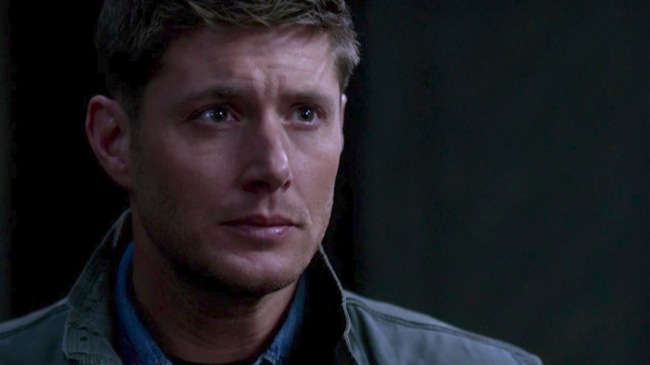
Jensen Ackles gives us Dean’s humor, his heart, and his ability to forgive here. He is as deadpan as ever in his delivery of lines opposite Sheppard’s Crowley—and with Kevin. Even though Dean has rubbed some salt into some festering wounds by listing things such as Ruby and Lilith, we see Ackles have fun with this scene as he delivers the line, “Or, hey, h-how about what you did to, uh, Penny Markle in the sixth grade? Why don’t you lead with that?” Ackles shows us Dean’s concern and caution when working with Castiel. He, too, wants to believe they’re going to be luck enough to win twice—but he’s a Winchester and knows better. Ackles has always played a great foil to Collins—and that is no different here. That being said, his most powerful scene comes with his co-star Padalecki, as Dean freely admits first his wrongs by admiring he’s said some “junk” that he shouldn’t have, and then finishing by telling Sam that he’ll never put anything before Sam. He conveys the elder Winchester’s relief once Sam relinquishes the Trials—only to slam into full on protective older brother mode as Sam collapses. Ackles puts all of Dean’s fear and anxiety into the line, “Sam? I got you, little brother. You’re gonna be just fine.” As he is the one to close the episode, Ackles puts all of Dean’s awe, too, in the line, “Angels. They’re falling.” Knowing Dean, however, he will be more concerned with Sam.
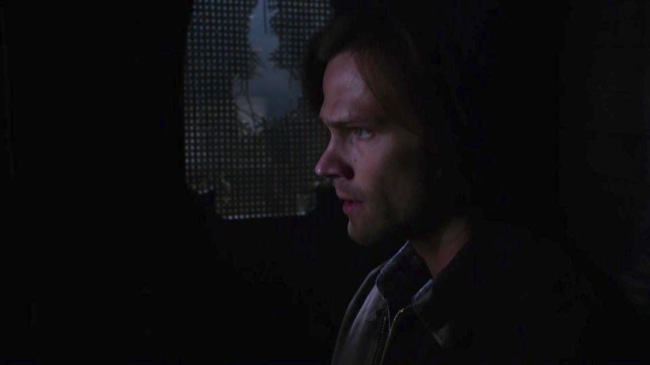
Jared Padalecki subtlety tells Sam’s story through body language and tone. We sense in the scene between Sam, Dean, and Crowley at Bobby’s yard that he is calling upon his steely resolve—and it shows clearly in Padalecki’s stance and stony expression. As he acts out the charade with Dean in front of Crowley, fighting about reading the contract for himself, we can tell that it’s not all an act. Padalecki tightens Sam’s jaw and his tone becomes tense. Once alone in confession, his quiet delivery of the line, “..if anybody’s listening, here goes,” shows us Sam’s inner conflict and sadness. Padalecki softens his expression, too, making Sam look vulnerable. Alone with Crowley, he becomes a bit more closed off, protecting himself from anything the King of Hell may throw at him. We see his anger best when bit and the swift punch that follows is hard and fast in retribution. Padalecki and Sheppard have chemistry that feeds well into the scenes here, and we see as Crowley begins to “cure” that Sam is becoming more forgiving but no less resolved. We also see Sam’s disbelief after Crowley shouts about wanting to be loved, conveyed best in Padalecki’s utterance of “What?” However, it is once Sam has stopped the trials that Padalecki drives everything home. His confession to Dean is moving, powerful, and emotional. He conveys all of Sam’s hurt and pain here. What Padalecki does well is seemingly shrink himself, making his large frame seem all the more vulnerable as Sam pleads with Dean. He, in that moment, truly becomes the little brother. Once he lets it go, we see relief flicker only to be replaced by absolute agony, and we are left to worry the summer over Sam’s fate.
Best Lines of the Week:
Dean: Whoa – talk first, stab later.
Dean: This is a secret lair, OK? No keggers.
Kevin: Okay, a-and I should have mentioned this six months ago, but the sports metaphors… You want to motivate me – “Magic” cards, “Skyrim,” Aziz Ansari.
Sam: Biting? Seriously?
Abaddon: Oh, no, it’s just little, old, unkillable me.
Now, is it October yet?



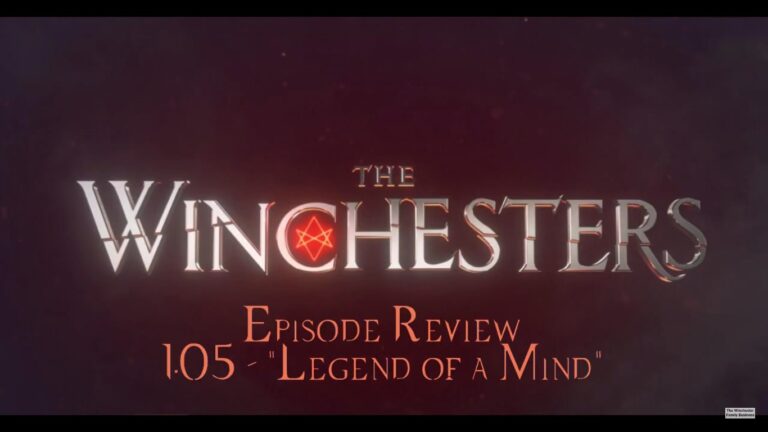
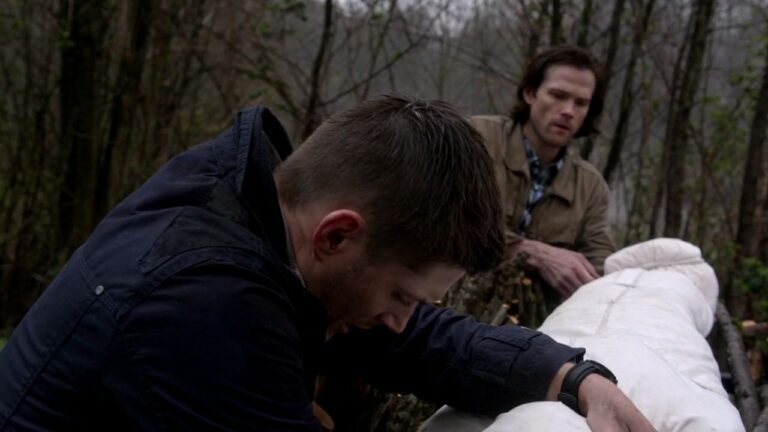
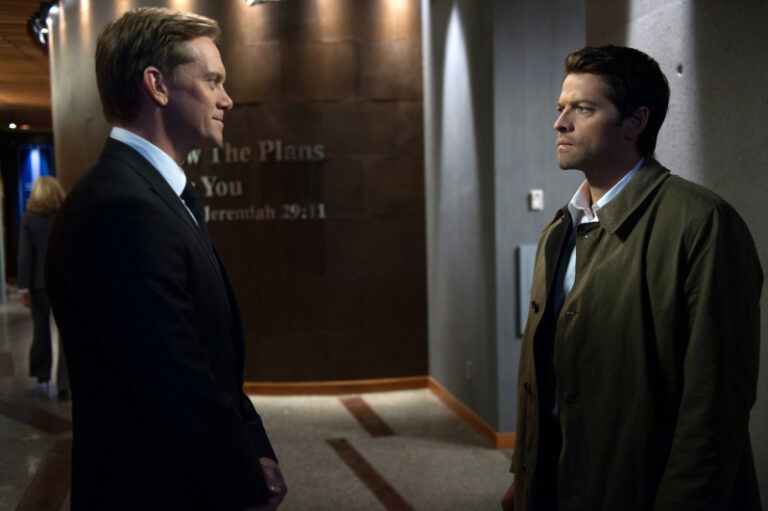

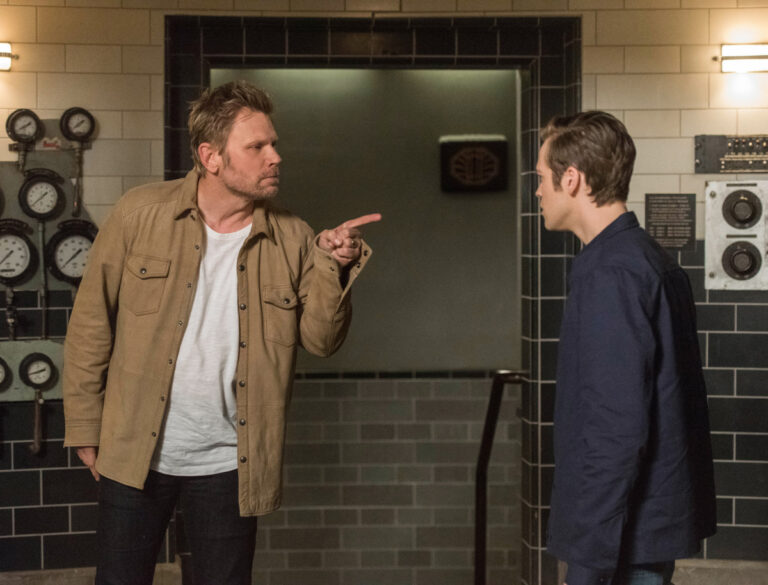

I like how you forcus all of Sam’s guilt on his not being able to save Dean from Hell after Dean made the crossroads deal to bring Sam back from the dead. That is a heavy burden to bear for sure. Anyone, even if you’re not related would have a hard time living with knowing someone gave their life for theirs. Survivor’s guilt is a very tough thing!
Thanks for the comment.
It really hit me in the second viewing. It just made sense to me that the big reason Sam was so gungho about these Trials is because he could finally atone for not stopping Dean from going to Hell. It’s so sad. Survivor’s Guilt is a very tough thing. We know that’s partly why Dean made the deal, too. He most certainly wanted to get Sam back, but he also wanted to atone for being saved by John’s deal.
I know it’s not explicitly said here, but Jared sold me on that concept for Sam just by how he delivered his lines and held himself. I could see a little boy standing there, pleading with Dean that he was sorry he couldn’t stop the hell hounds all the way back in s3.
I’m glad you liked that take.
Thanks!
Nicely phrased, Far Away Eyes – about Jared seemingly shrinking himself, looking so young and vulnerable. It was amazing and unexpected. Don’t know why but I always saw Sam as a stronger brother, with more self-control and confidence in him than Dean. And this impressive wingspan of his – he should wear some royal mantle! He does look like a king in an exile. So I was deeply impressed with his sudden openness.
And yes, we can’t help but worry about Sam. How can he possibly recover if God wants this sacrifice to complete? Or maybe these glowing hands signify that now Sam possesses some celestial power -Â kind of supernatural magic he used to have in earlier seasons but from the purer source this time? With Cas deprived of his grace that would be handy. Just a thought.
Thanks for the comment!
It’s always amazing what Jared manages to do on screen. I thought he looked a lot like a little boy in that scene with Dean, even more so when he asked almost afraid, “How do I stop?” He’s such a large man, and yet he can make us see him as small and vulnerable when need be—and that’s amazing talent.
I don’t know what their aim for Sam will be in s9 or if he’ll get powers of a different sort. We do know that he’s been changed forever by the Trials, even if he never completes them, but I’ll be interested to see how that manifests more than just coughing blood or being in serious pain. Maybe it will be more angelic than demonic this time. There’s so much opportunity here.
Thanks again!
i, too, was struck by how childlike sam seemed in the last scene — esp. at the very end when he was sitting against the impala and looking up at the angels falling. he reminded me of a 3 or 4 yr old child– very, very young and vulnerable next to his trusted big brother. it was very touching and i was so completely impressed that jared could embody and invoke such “little-boyness” and childlike vulnerability. i swear every time i watch the last few moments i feel i’m looking at a four year old and i just want to pull him into my arms and reassure and comfort him, like anyone would feel compelled to with a frightened young child. kudos to jp’s stellar acting here.
I have always been impressed by how Jared can make Sam so very young looking and vulnerable. He can go from being Hunter!Sam to Little Boy!Sam in the blink of an eye. Sam looked so very young and vulnerable in these last scenes with Dean, he pretty much ripped my heart to shreds. It was fabulous acting by Jared. These last scenes were positively dripping with the Big brother/Little brother dynamic and I loved it all so much. The hug was such a ‘little brother being comforted by his big brother’ hug and it made me all melty inside. 😀 I can’t wait to see what happens to Sam’s storyline next season. I really hope S9 picks up exactly where this finale ended. No time gap this year, please Mr. Carver. 🙂
Thank you for this wonderful review. I always look forward to your reviews, you write so beautifully.
The big brother/little brother dynamics in that scene was marvelous to watch. It’s like the magic of the earlier seasons is back. Dean is at his most comfortable when he’s beeing protective and caring, specially regarding Sam. That’s why I love his big brother side. No matter how much they mature, I hope THIS never change.
Excellent review. Some very interesting insights and I agree about the survivor’s guilt.
That’s an interesting idea about the glowing arms. Maybe he’s still resonating on some sort of Angel frequency. I would love it if that whole glowing arms thing turned out to be a good thing-like the power to heal or something. We’re getting a little weary of Sick!Sam.
Thanks for the comment.
I think that both brothers suffer somewhat from the survivor’s guilt. It’s part of their make up, considering everything that has happened to them and their family.
We do know that Sam resonated with Metatron due to the Trials. It’s possible that he’s still resonating with something or someone. I wonder if his collapse is in anyway connected perhaps to the falling of the angels. Perhaps not directly, but they do happen around the same time. I’ll be curious to see if that is the case in S9.
Thanks again!
Ikeke35, if Sam could heal, that would be great! Being able to giving angels back their grace would be, of course, too much of a good thing to come true. Or is it possible? I’m thinking of Cas, and don’t know what to think. There are powers that are always on Cas’ side, somebody repeatedly resurrects him (good if this somebody is God). I mean, maybe we needn’t need to worry of him, but Sam and his luck… Would be so nice of the writers to reverse positions for a change. Let Sam be the strong one, and Dean the one who needs protection ( I mean, temporary!) It will be a good lesson for the both of them, and maybe they will start to understand each other at last.